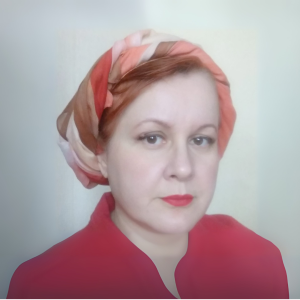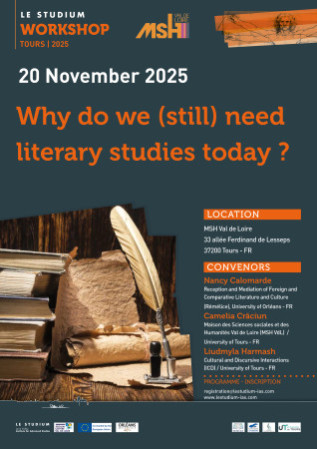Liudmyla Harmash

From
H.S. Skovoroda National Pedagogical University, Kharkiv - UA
In residence at
Cultural and Discursive Interactions (ICD) / University of Tours - FR
Host scientist
Anna Krykun
BIOGRAPHY
Liudmyla Harmash is Professor of Literature at H. S. Skovoroda Kharkiv National Pedagogical University (Ukraine). She holds a PhD in Literature from the same university, where she defended her dissertation on the poetics of Andrei Bely, Fyodor Sologub, and other representatives of Russian symbolism and modernism.
She is the author of numerous scholarly articles and conference papers exploring the cognitive and affective dimensions of wartime discourse, the semiotics of resistance, and the role of artistic expression in processes of collective recovery. Her research situates Ukrainian cultural production within broader frameworks of global memory cultures, decolonial theory, and postimperial narratives.
A laureate of the International Advanced Fellowships Program at Babeș-Bolyai University (Cluj-Napoca, Romania, 2022), she served from 2018 to 2024 as Editor-in-Chief of the philological journal Scientific Notes of H. S. Skovoroda Kharkiv National Pedagogical University. Literary Studies. Between 2023 and 2025, she was a Researcher at EUR’ORBEM, Institute of Slavonic Studies, Sorbonne Université (France), where she conducted a study on Ukrainian wartime songs.
Her research interests include contemporary Ukrainian literature; symbolism and modernism in literature; world literature of the 19th–21st centuries; literary thanatology; mythopoetics; narratology; intermediality; and culturology. Her current work focuses on the interrelation between trauma and memory in Ukrainian wartime literature, examining how poetic and musical texts contribute to the construction of national identity and collective resilience in times of conflict.
PROJECT
Fictional and Non-fictonal Ukrainian Literature of the Russian-Ukrainian War
This research examines Ukrainian wartime literature, both fictional and non-fictional, to analyze its engagement with cultural reparation, collective memory, and politically charged historical discourses. It explores how these texts address themes of loss, trauma, and injustice, integrating documentary evidence, historical facts, and personal accounts.
The study emphasizes literature’s role in psychological rehabilitation, societal resilience, and unity during conflict while addressing broader epistemological challenges in cultural and historical understanding. It highlights literature’s capacity to document and reinterpret traumatic experiences, foster collective memory, and serve as a tool for narrative therapy and social cohesion. It also examines how wartime literature constructs "imagined communities" (Benedict Anderson) and redefines individual and collective identities during crises, contributing to global discussions on memory, trauma, and identity.
Collaborations with Ukrainian and European research institutes enhance the interdisciplinary approach. The project aligns with the 2024-2028 program "Individual and Community" of the Interactions Culturelles et Discursives (ICD) research unit at the University of Tours and NEOLAiA university consortium.
Key initiatives include a Trauma and Memory Studies conference, a seminar on postcolonial and post-totalitarian themes, and a digital archive of Ukrainian wartime literature. These efforts aim to produce joint publications, establish a sustainable research network, and involve emerging scholars. The outcomes will advance academic understanding and provide practical applications for cultural reparation and psychological rehabilitation in post-conflict societies.

